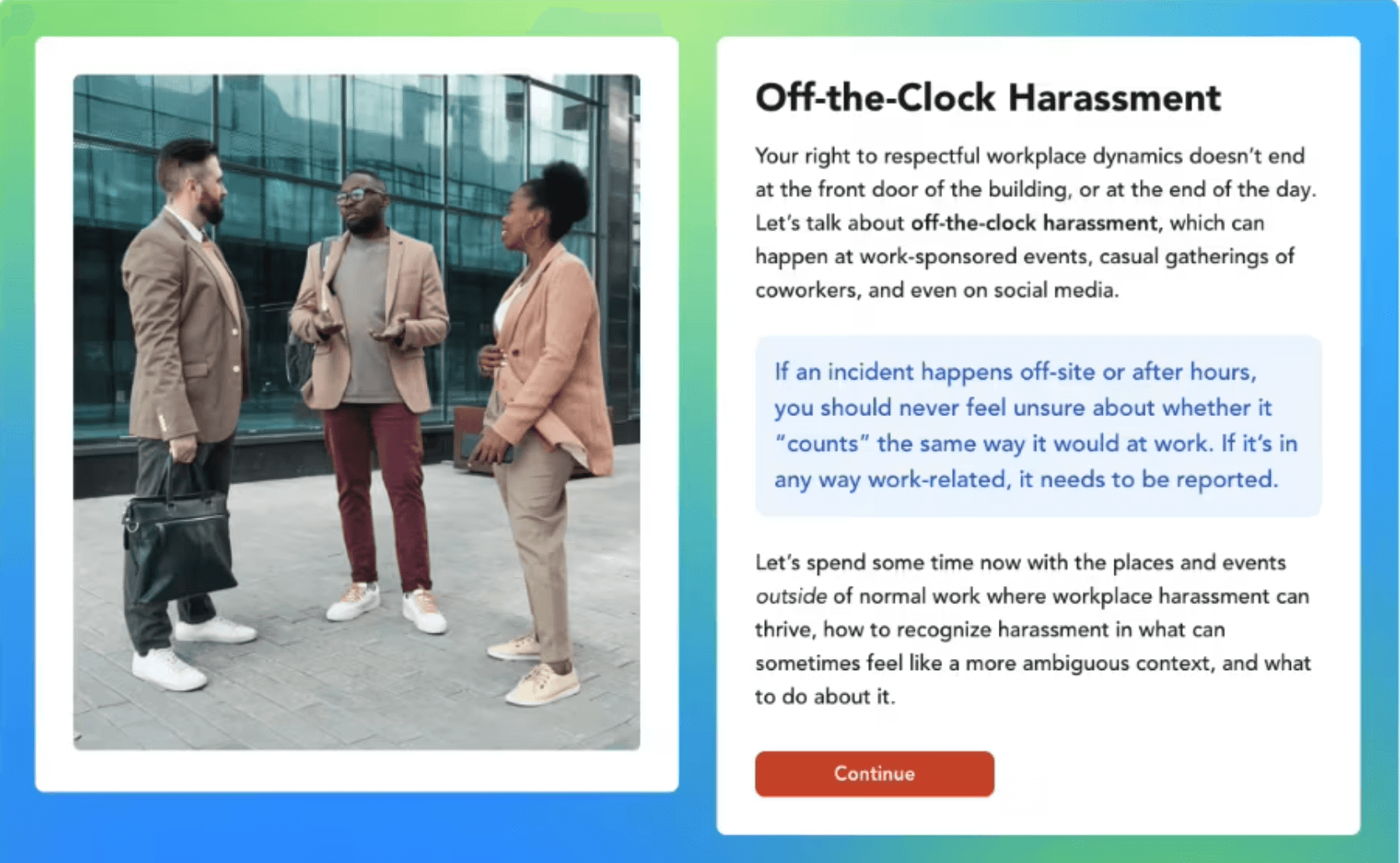Navigating sexual harassment training requirements in the United States can be complex. There's no single federal mandate, but a growing patchwork of state and local laws means employers, especially those with distributed teams, face a tricky compliance landscape. This patchwork of laws is continually evolving, with new jurisdictions periodically adding or updating their requirements. This means its critical to stay on top of these changes which is made easier by choosing training provider who is a trusted partner.
While federal law doesn't require training, the Equal Employment Opportunity Commission (EEOC) strongly encourages it. Effective training is a key preventative measure against harassment in the workplace. It encourages reporting, creates safer workplaces, and can be crucial for establishing a legal defense against harassment claims. On top of that, states like California, New York, Illinois, along with cities like Chicago and New York City, have implemented their own specific training mandates with varying requirements for frequency, duration, content, and covered employees.

This guide provides an overview of sexual harassment training requirements for private-sector employers across the United States to help companies ensure compliance.
Which states require sexual harassment training?
The legal landscape for sexual harassment training is a maze of state and local laws. Requirements often depend on employer size, industry, and where employees are located or work. Here’s an overview of the jurisdictions with specific rules, with the next section of the guide providing more information about the specific requirements in each location:
Jurisdictions with Mandatory Training Requirements:
- Broad Mandates: Several states and cities require training for most employers, including California (5+ employees), Chicago (all employers), Connecticut (3+ employees), Delaware (50+ employees), Illinois (all employers), Maine (15+ employees), New York (all employers), and New York City (15+ employees).
- Specific or Industry-Based Mandates: Other jurisdictions have targeted requirements for specific employer types or industries. This includes Washington (for employers of "isolated workers" in specific industries), Washington, D.C. (for businesses that employ tipped workers), and Virginia (for certain state contractors).
Jurisdictions Recommending Training:
While not mandatory, states like Colorado, Massachusetts, Oregon, Rhode Island, and Vermont have laws that officially encourage employers to provide sexual harassment training.
Other Jurisdictions:
For all other states, while no specific training mandate exists, providing harassment prevention training remains a best practice and is strongly encouraged by the EEOC to prevent harassment in the workplace.
- This includes: Alabama, Alaska, Arizona, Arkansas, Florida, Georgia, Hawaii, Idaho, Indiana, Iowa, Kansas, Kentucky, Louisiana, Maryland, Michigan, Minnesota, Mississippi, Missouri, Montana, Nebraska, Nevada, New Hampshire, New Jersey, New Mexico, North Carolina, North Dakota, Ohio, Oklahoma, Pennsylvania, South Carolina, South Dakota, Tennessee, Texas, Utah, Wisconsin, and Wyoming.
How Long Is Sexual Harassment Training?
There is no one-size-fits-all answer, because training duration depends on local laws and employer choices. Here’s what you should know:
- In jurisdictions with mandates, the required duration typically ranges from 1 to 2 hours (it can vary depending on if the employee is a supervisor).
- In locations without strict legal training rules, many organizations often train for 30-60 minutes as a best practice due to federal recommendations.
In the state-specific requirements below, we'll break down all of the specific time-based requirements.
What are the state-specific requirements?
The following details the requirements for states with mandatory or strongly recommended training:
Alabama
- There are no sexual harassment training requirements or recommendations at the state level.
Alaska
- There are no sexual harassment training requirements or recommendations at the state level.
Arizona
- There are no sexual harassment training requirements or recommendations at the state level.
Arkansas
- There are no sexual harassment training requirements or recommendations at the state level.
California
- Mandatory Training? Yes
- Employers Affected: Employers with five or more employees, including temporary or seasonal workers.
- Who Must Receive Training:
All supervisory and nonsupervisory employees. Training must be provided within six months of an employee's hire or their assumption of a supervisory role.
For seasonal, temporary, or any employees hired for less than six months, training must occur within 30 calendar days of hire or within 100 hours worked, whichever is first. - Frequency: Every two years.
- Content Requirements: The training must cover federal and California laws on sexual harassment, including definitions, statutory provisions, and examples of prohibited conduct. It must also include strategies for prevention, supervisors' reporting obligations, information on remedies, and how to handle harassment accusations. The training must also address abusive conduct and harassment based on gender identity, gender expression, and sexual orientation. Optional bystander intervention training is also encouraged.
- Format / Duration: At least two hours for supervisors and one hour for nonsupervisory employees. Training must be interactive and can be in-person, online, or via webinar.
- Recordkeeping: Employers must maintain training documentation for at least two years.
- Resources:
Sexual Harassment Prevention Training: Information for Employers (California Civil Rights Department)
Ethena California Sexual Harassment Prevention Training
Colorado
- Mandatory Training? No, but recommended by state regulations
- Who Should Train? All employers covered by the Colorado Fair Employment Practices Act
- Who Should Receive Training? All employees
- Notes: The Colorado Civil Rights Commission encourages employers to take all necessary steps to prevent discrimination and harassment, including training.
Connecticut
- Mandatory Training? Yes
- Employers Affected: Employers with three or more employees must train all employees. Employers with fewer than three employees must train supervisors only.
- Who Must Receive Training:
All employees if the employer has three or more employees.
Supervisors only if the employer has fewer than three employees. - All employees if the employer has three or more employees.
- Supervisors only if the employer has fewer than three employees.
- Frequency: Every ten years
- Content Requirements: Training must cover federal and Connecticut statutory provisions on sexual harassment, remedies for victims, definitions, types of conduct constituting harassment, and strategies for prevention.
- Format / Duration: At least two hours and must be interactive.
- Recordkeeping: Records should be maintained for at least one year, or until any pending discrimination complaint is resolved.
- Resources:
Frequently Asked Questions (CHRO)
Ethena Connecticut Harassment Prevention Training
Delaware
- Mandatory Training? Yes
- Employers Affected: Employers with 50 or more employees in Delaware.
- Who Must Receive Training:
All employees within one year of hire
All supervisors within one year of starting as a new supervisor - Frequency: Every two years
- Content Requirements: Training must cover the illegality of sexual harassment, definitions with examples, legal remedies, complaint processes, Delaware Department of Labor contact information, and the prohibition against retaliation. Supervisor training must include their specific responsibilities.
- Format / Duration: Must be interactive
- Recordkeeping: Not specified
- Resources: Ethena Delaware Harassment Prevention Training
Florida
- There are no sexual harassment training requirements or recommendations at the state level.
Georgia
- There are no sexual harassment training requirements or recommendations at the state level.
Hawaii
- There are no sexual harassment training requirements or recommendations at the state level.
Idaho
- There are no sexual harassment training requirements or recommendations at the state level.
Illinois
- Mandatory Training? Yes
- Employers Affected: All employers with employees working in Illinois
- Who Must Receive Training: All employees working in Illinois.
- Frequency: At least annually.
- Content Requirements: Training must include an explanation of sexual harassment, examples of unlawful conduct, relevant federal and Illinois statutory provisions, and employer responsibilities in prevention and correction. For restaurants and bars operating in Illinois, training must also include industry-specific conduct, an explanation of manager liability, and must be available in both English and Spanish.
- Format / Duration: Employers can use the state's model training or develop their own program that meets or exceeds the model's standards.
- Recordkeeping: Employers must maintain records for five years or the duration of any pending claim.
- Resources:
Sexual Harassment Prevention: Frequently Asked Questions (FAQ)
Ethena Illinois Sexual Harassment Prevention Training
Indiana
- There are no sexual harassment training requirements or recommendations at the state level.
Iowa
- There are no sexual harassment training requirements or recommendations at the state level.
Kansas
- There are no sexual harassment training requirements or recommendations at the state level.
Kentucky
- There are no sexual harassment training requirements or recommendations at the state level.
Louisiana
- There are no sexual harassment training requirements or recommendations at the state level.
Maine
- Mandatory Training? Yes
- Employers Affected: Employers with 15 or more employees.
- Who Must Receive Training: All new employees within one year of employment. Additional training for supervisory and managerial employees within one year of employment.
- Frequency: Only required for new employees and new supervisors/managers within one year of their start date.
- Content Requirements: Training must cover the illegality of sexual harassment, definitions with examples, internal complaint processes, legal recourse through the Maine Human Rights Commission, and retaliation protections. Supervisor training must include their specific responsibilities and actions to address complaints.
- Format / Duration: Not specified
- Recordkeeping: Employers must maintain records for at least three years
- Resources: Ethena Maine Sexual Harassment Prevention Training
Maryland
- There are no sexual harassment training requirements or recommendations at the state level.
Massachusetts
- Mandatory Training? No, but recommended
- Who Should Train? All employers
- Who Should Receive Training? New employees within one year of hire. Additional training for new supervisors.
- Recommended Content: The training should include the information from the employer's anti-harassment policy, such as statements on the unlawfulness of harassment and retaliation, examples of harassment, consequences for violators, and the internal complaint process. Supervisor training should also cover their specific responsibilities and the actions they must take to address complaints.
Michigan
- There are no sexual harassment training requirements or recommendations at the state level.
Minnesota
- There are no sexual harassment training requirements or recommendations at the state level.
Mississippi
- There are no sexual harassment training requirements or recommendations at the state level.
Missouri
- There are no sexual harassment training requirements or recommendations at the state level.
Montana
- There are no sexual harassment training requirements or recommendations at the state level.
Nebraska
- There are no sexual harassment training requirements or recommendations at the state level.
Nevada
- There are no sexual harassment training requirements or recommendations at the state level.
New Hampshire
- There are no sexual harassment training requirements or recommendations at the state level.
New Jersey
- There are no sexual harassment training requirements or recommendations at the state level.
New Mexico
- There are no sexual harassment training requirements or recommendations at the state level.
New York
- Mandatory Training? Yes
- Employers Affected: All employers in New York
- Who Must Receive Training: All employees who work any portion of their time in New York
- Frequency: Annually
- Content Requirements: The training must explain sexual harassment, provide examples, and give information on relevant federal and state laws, remedies, and available forums for complaints. It must also address supervisor conduct and responsibilities.
- Format / Duration: Must be interactive
- Recordkeeping: Employers are encouraged to keep a copy of training records
- Resources: Ethena New York Sexual Harassment Prevention Training
North Carolina
- There are no sexual harassment training requirements or recommendations at the state level.
North Dakota
- There are no sexual harassment training requirements or recommendations at the state level.
Ohio
- There are no sexual harassment training requirements or recommendations at the state level.
Oklahoma
- There are no sexual harassment training requirements or recommendations at the state level.
Oregon
- Mandatory Training? No, but recommended
- Who Should Train? All employers.
- Who Should Receive Training: All employees.
- Recommended Content: Oregon's Bureau of Labor and Industries recommends that training explain policies and complaint procedures and help employees understand what constitutes prohibited conduct.
Pennsylvania
- There are no sexual harassment training requirements or recommendations at the state level.
Rhode Island
- Mandatory Training? No, but recommended
- Who Should Train? Employers with 50 or more employees.
- Who Should Receive Training: New employees within one year of hire. Additional training for new supervisors.
- Recommended Content: The training should include information from the employer's anti-harassment policy, covering the illegality of harassment and retaliation, examples of harassment, consequences for violators, the internal complaint process, and contact information for enforcement agencies. Supervisor training should also address their specific responsibilities and methods for taking corrective action.
South Carolina
- There are no sexual harassment training requirements or recommendations at the state level.
South Dakota
- There are no sexual harassment training requirements or recommendations at the state level.
Tennessee
- There are no sexual harassment training requirements or recommendations at the state level.
Texas
- There are no sexual harassment training requirements or recommendations at the state level.
Utah
- There are no sexual harassment training requirements or recommendations at the state level.
Vermont
- Mandatory Training? No, but recommended
- Who Should Train? All employers.
- Who Should Receive Training: New employees within one year of hire. Additional training for supervisors.
- Recommended Content: Training should cover the information in the employer's anti-harassment policy, including the illegality of harassment and retaliation, examples, consequences, the internal complaint process, and information on enforcement agencies. Supervisor training must also include their specific responsibilities and required actions to address complaints.
Virginia
- Mandatory Training? Yes, for select employers and employees.
- Employers Affected: Contractors with a government contract of over $10,000 and five or more employees.
- Who Must Receive Training: All supervisors and employees providing services in Virginia under the contract.
- Frequency: Annually for the duration of the contract.
- Content Requirements: The training must cover the contractor’s sexual harassment policy.
- Format / Duration: Not specified
- Recordkeeping: Not specified
Washington
- Mandatory Training? Yes
- Employers Affected: Hotel, motel, retail, and security guard employers, as well as property services contractors.
- Who Must Receive Training: Currently, employees who are janitors, security guards, hotel/motel housekeepers, or room service attendants who work alone for a majority of their time
- Starting January 1, 2026, the scope of employees who require training expanded to include all managers, supervisors, and "isolated employees" of covered employers
- Frequency: Not specified
- Content Requirements: he training must cover the prevention of sexual assault, sexual harassment, and sexual discrimination. It must also educate employees on protections for whistleblowers and provide a list of resources, including contact information for the Washington Human Rights Commission and local advocacy groups
- Format / Duration: Not specified
- Recordkeeping: Property services contractors must submit data to the Washington Department of Labor & Industries, including the date the policy was adopted and the number of individuals trained; this became an annual requirement on January 1, 2026
Wisconsin
- There are no sexual harassment training requirements or recommendations at the state level.
Wyoming
- There are no sexual harassment training requirements or recommendations at the state level.
What are the city-specific requirements?
The following details the requirements for cities with mandatory or strongly recommended training:
Chicago
- Mandatory Training? Yes
- Employers Affected: All employers with one or more employees that are either subject to Chicago licensing or have a business facility in the city.
- Who Must Receive Training: All employees working in Chicago
- Frequency: Annually
- Content Requirements: For sexual harassment prevention, employers can use the Illinois state model training or their own equivalent program. 50 The city also mandates separate bystander training.
- Format / Duration: One hour of sexual harassment training for all employees, two hours for supervisors, and one hour of bystander training for all employees. The training must meet the State of Illinois' content requirements
- Recordkeeping: Employers must maintain records for five years or the duration of any claim pending, whichever is longer.
- Resources:
Chicago Commission on Human Relations: Sexual Harassment
Sexual Harassment Training Materials
New York City
- Mandatory Training? Yes
- Employers Affected: Employers with 15 or more employees, including independent contractors.
- Who Must Receive Training: All employees and interns working in NYC for more than 80 hours in a calendar year and for at least 90 days. Independent contractors who meet similar work duration thresholds must also be trained unless they have received the training elsewhere.
- Frequency: Annually
- Content Requirements: The training must explain that sexual harassment is a form of unlawful discrimination under city, state, and federal law. It must include a description of harassment with examples, details on internal and external complaint processes, information on bystander intervention, and a prohibition on retaliation. It must also cover the specific responsibilities of supervisors and managers.
- Format / Duration: Must be interactive
- Recordkeeping: Employers must keep records, including a signed employee acknowledgment, for at least three years.
- Resources: Stop Sexual Harassment in NYC Act Frequently Asked Questions
Washington, DC
- Mandatory Training? Yes
- Employers Affected: Businesses that employ individuals who receive gratuities (tipped employees).
- Who Must Receive Training: All employees who receive gratuities, as well as managers, owners, and operators of the business.
- Frequency: Tipped employees must receive initial training within 90 days of hire. Managers, owners, and operators must attend training at least once every two years.
- Content Requirements: The training must cover how to respond to, intervene in, and prevent sexual harassment from coworkers, management, and patrons.
- Format / Duration: Employees, owners, and operators can attend training online or in person. Managers are required to attend in-person training. Training must be provided by the D.C. Office of Human Rights (OHR) or a certified trainer.
- Recordkeeping: Not specified
- Resources: Sexual Harassment Prevention Training and Documentation Compliance for Tipped Wage Workers Fairness Amendment Act FAQ
What about the states above that don’t mandate or recommend training?
Just because a state doesn't require training doesn't mean employers should skip it. Effective harassment training creates better workplaces - it builds awareness, sets clear expectations, and gives employees tools to address issues before they escalate.
From a risk perspective, the EEOC considers training essential for demonstrating reasonable care. Employers without training programs struggle to defend harassment claims when they arise.
The upside is significant: Training reduces incidents, improves workplace culture, and shows employees that the company is committed to a respectful environment. Plus, employers will be better positioned if they ever face a claim.
Simplify sexual harassment training requirements with Ethena
Managing compliance across multiple jurisdictions is a headache - especially when requirements keep changing. Ethena eliminates the guesswork.
Our platform automatically updates training content as regulations evolve, so companies stay up-to-date without constantly monitoring legal changes. Teams get the right training for their location, and employers get peace of mind.
No more spreadsheets tracking different state requirements or worrying about missed updates. Just engaging training that actually works.
Get a taste of Ethena's Harassment Prevention Training:
Ready to demystify the harassment training requirements by city and state that your team needs? Get in touch with us today or grab a free sample of our Harassment Prevention Training below.

Disclaimer: This content is provided for informational purposes only and does not contain every detail or requirement of the applicable laws. It is not a substitute for legal advice and should not be relied upon as a standalone resource. Laws and requirements may change, and this document reflects our understanding as of the date of publication. Please contact your legal counsel for guidance on how these laws may apply to your company.








